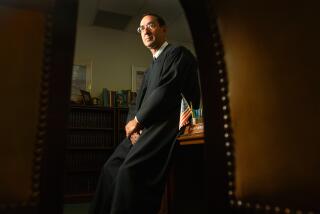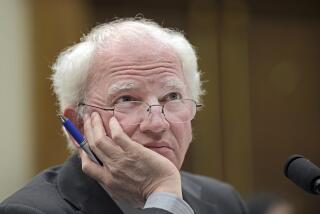Case Against Retired Jurist Is Upheld
- Share via
A state panel has concluded that retired Judge Robert Bradley demeaned the Ventura County bench and violated judicial ethics during a series of alcohol-related arrests, findings that could result in his censure and being barred from future assignments.
At the same time, however, the three-judge panel noted strong support in the legal community for Bradley’s return to the bench if he can “overcome his addiction to alcohol and convincingly establish his ability to maintain complete sobriety.”
Nine witnesses who described Bradley as a “bright, thorough, hard-working and fair-minded judge” before his first drunk-driving arrest in December 1997 were “highly credible,” the panel wrote.
After presiding over a two-day trial in December, the panel sustained all nine counts brought against Bradley by attorneys for the state Commission on Judicial Performance. They include two drunk-driving convictions and accusations involving showing up for work intoxicated, failing to do his job and habitual use of alcohol while a judge.
But the panel rejected the contention Bradley’s actions constituted willful misconduct, or bad faith, as argued by a commission attorney. Instead, Bradley’s misconduct was “prejudicial” in that it brought disrepute to the judiciary, wrote the judges in the legal brief filed Tuesday.
Bradley’s attorney, Thomas Brayton, said he is satisfied with the judges’ conclusions.
“The issue in this case is whether Judge Bradley can maintain his sobriety. If he can, then the Commission on Judicial Performance should give serious consideration to letting him sit on assignment in the future,” Brayton said.
Bradley, 57, is living in an alcohol-treatment center in Ventura, completing a court-imposed rehabilitation program, said Brayton, who said he last talked to his client three weeks ago. The former jurist has maintained his sobriety “as far as I know,” Brayton said.
The judges’ panel is prohibited from making a recommendation on discipline. But its analysis will be weighed by the Commission on Judicial Performance when it decides what action Bradley should face, commission Director Victoria Henley said.
Commission members will very likely take up the case this spring, Henley said. Penalties range from censure to being barred from receiving judicial assignments. Bradley’s judicial seat was filled in November, but he has expressed interest in serving as a temporary judge, a lucrative position that pays $397 a day.
Justices William A. Stone of Fresno, Judith L. Haller of San Diego and Richard L. Patsy of Contra Costa County presided over a two-day hearing last month at the appellate court in Ventura.
Witnesses described six incidents involving Bradley’s alcohol abuse between Dec. 6, 1997, and May 15, 1998, including two drunk-driving arrests, arriving at work intoxicated, threats against his estranged wife’s friend and breaking into his family’s Ojai home while drunk.
During his first drunk-driving arrest, Bradley violated the Code of Judicial Ethics by informing the officer he was a judge and asking to be allowed to drive himself home, the judges’ panel found.
Bradley eroded the integrity of his office, undermined public confidence in the judiciary and improperly sought to use the prestige of his office to advance personal interests, all violations of judicial ethics, the panel found. But his actions did not rise to the level of willful misconduct, the judges said.
“Although respondent’s conduct demeaned the integrity and public image of the judiciary, it did not occur while respondent was acting in a judicial capacity,” the judges wrote.
Similar findings were made in the other counts. The panel also concluded Bradley had demonstrated habitual intemperance and an inability to perform his judicial duties. During a four-month period, from Dec. 8, 1997, to March 30, 1998, he was available to work only six days, they said.
Although he spent the time in alcohol treatment programs or in jail, “the responsibility for [Bradley’s] inability to perform his judicial duties during the bulk of this period lies directly with [him].”
Dist. Atty. Michael D. Bradbury, Public Defender Kenneth Clayman and appellate Justice Steven Stone of the 6th District Court of Appeal were among those who spoke highly of Bradley at his December hearing. Bradley’s former colleagues described him as a capable judge whose life derailed amid a painful divorce and a spiraling drinking problem.
Bradley’s psychiatrist told the judges’ panel that the jurist was suffering from post-traumatic stress syndrome as a result of facing combat in Vietnam. If Bradley is treated for the disorder, his chances of recovering from alcoholism are greater, Dr. Lloyd Moglen told the panel.
More to Read
Sign up for Essential California
The most important California stories and recommendations in your inbox every morning.
You may occasionally receive promotional content from the Los Angeles Times.














